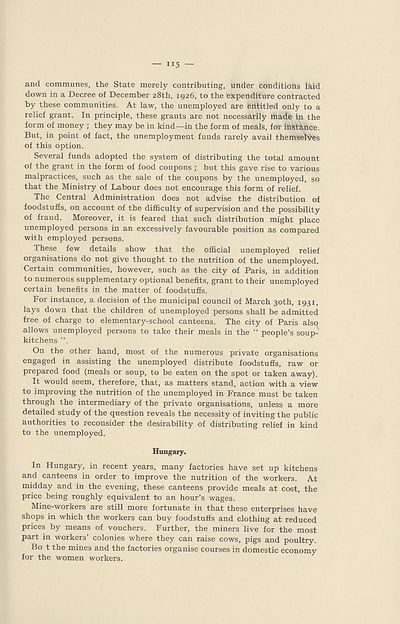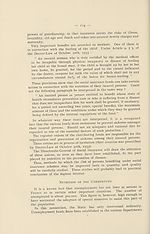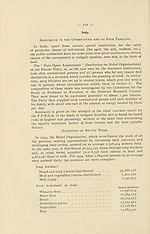Download files
Complete book:
Individual page:
Thumbnail gallery: Grid view | List view

and communes, the State merely contributing, under conditions laid
down in a Decree of December 28th, 1926, to the expenditure contracted
by these communities. At law, the unemployed are eiititled only to a
relief grant. In principle, these grants are not necessarily made in the
form of money ; they may be in kind—in the form of meals, for instance.
But, in point of fact, the unemployment funds rarely avail themselves
of this option.
Several funds adopted the system of distributing the total amount
of the grant in the form of food coupons ; but this gave rise to various
malpractices, such as the sale of the coupons by the unemployed, so
that the Ministry of Labour does not encourage this form of relief.
The Central Administration does not advise the distribution of
foodstuffs, on account of the difficulty of supervision and the possibility
of fraud. Moreover, it is feared that such distribution might place
unemployed persons in an excessively favourable position as compared
with employed persons.
These few details show that the official unemployed relief
organisations do not give thought to the nutrition of the unemployed.
Certain communities, however, such as the city of Paris, in addition
to numerous supplementary optional benefits, grant to their unemployed
certain benefits in the matter of foodstuffs.
For instance, a decision of the municipal council of March 30th, 1931,
lays down that the children of unemployed persons shall be admitted
free of charge to elementary-school canteens. The city of Paris also
allows unemployed persons to take their meals in the “ people’s soup-
kitchens ”.
On the other hand, most of the numerous private organisations
engaged in assisting the unemployed distribute foodstuffs, raw or
prepared food (meals or soup, to be eaten on the spot or taken away).
It would seem, therefore, that, as matters stand, action with a view
to improving the nutrition of the unemployed in France must be taken
through the intermediary of the private organisations, unless a more
detailed study of the question reveals the necessity of inviting the public
authorities to reconsider the desirability of distributing relief in kind
to the unemployed.
Hungary.
In Hungary, in recent years, many factories have set up kitchens
and canteens in order to improve the nutrition of the workers. At
midday and in the evening, these canteens provide meals at cost, the
price being roughly equivalent to an hour’s wages.
Mine-workers are still more fortunate in that these enterprises have
shops in which the workers can buy foodstuffs and clothing at reduced
prices by means of vouchers. Further, the miners live for the most
part in workers’ colonies where they can raise cows, pigs and poultry.
Bo t the mines and the factories organise courses in domestic economy
for the women workers.
down in a Decree of December 28th, 1926, to the expenditure contracted
by these communities. At law, the unemployed are eiititled only to a
relief grant. In principle, these grants are not necessarily made in the
form of money ; they may be in kind—in the form of meals, for instance.
But, in point of fact, the unemployment funds rarely avail themselves
of this option.
Several funds adopted the system of distributing the total amount
of the grant in the form of food coupons ; but this gave rise to various
malpractices, such as the sale of the coupons by the unemployed, so
that the Ministry of Labour does not encourage this form of relief.
The Central Administration does not advise the distribution of
foodstuffs, on account of the difficulty of supervision and the possibility
of fraud. Moreover, it is feared that such distribution might place
unemployed persons in an excessively favourable position as compared
with employed persons.
These few details show that the official unemployed relief
organisations do not give thought to the nutrition of the unemployed.
Certain communities, however, such as the city of Paris, in addition
to numerous supplementary optional benefits, grant to their unemployed
certain benefits in the matter of foodstuffs.
For instance, a decision of the municipal council of March 30th, 1931,
lays down that the children of unemployed persons shall be admitted
free of charge to elementary-school canteens. The city of Paris also
allows unemployed persons to take their meals in the “ people’s soup-
kitchens ”.
On the other hand, most of the numerous private organisations
engaged in assisting the unemployed distribute foodstuffs, raw or
prepared food (meals or soup, to be eaten on the spot or taken away).
It would seem, therefore, that, as matters stand, action with a view
to improving the nutrition of the unemployed in France must be taken
through the intermediary of the private organisations, unless a more
detailed study of the question reveals the necessity of inviting the public
authorities to reconsider the desirability of distributing relief in kind
to the unemployed.
Hungary.
In Hungary, in recent years, many factories have set up kitchens
and canteens in order to improve the nutrition of the workers. At
midday and in the evening, these canteens provide meals at cost, the
price being roughly equivalent to an hour’s wages.
Mine-workers are still more fortunate in that these enterprises have
shops in which the workers can buy foodstuffs and clothing at reduced
prices by means of vouchers. Further, the miners live for the most
part in workers’ colonies where they can raise cows, pigs and poultry.
Bo t the mines and the factories organise courses in domestic economy
for the women workers.
Set display mode to:
![]() Universal Viewer |
Universal Viewer | ![]() Mirador |
Large image | Transcription
Mirador |
Large image | Transcription
Images and transcriptions on this page, including medium image downloads, may be used under the Creative Commons Attribution 4.0 International Licence unless otherwise stated. ![]()
| League of Nations > Economic and financial section > Problem of nutrition > (117) |
|---|
| Permanent URL | https://digital.nls.uk/190925283 |
|---|
| Shelfmark | LN.II |
|---|
| Description | Over 1,200 documents from the non-political organs of the League of Nations that dealt with health, disarmament, economic and financial matters for the duration of the League (1919-1945). Also online are statistical bulletins, essential facts, and an overview of the League by the first Secretary General, Sir Eric Drummond. These items are part of the Official Publications collection at the National Library of Scotland. |
|---|---|
| Additional NLS resources: |
|

